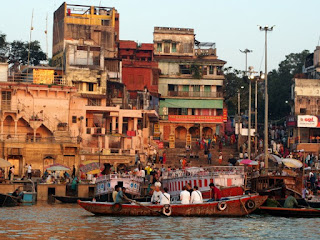Leaving Santokgarh was difficult as everyone became rather
emotional. We had been welcomed as family, treated as guests, fed and given accommodation and entertained for a week
and we felt all we had contributed was our presence, and a few small gifts
(though we had been presented with gifts too). Piyush's parents had hired a couple of cooks to help with the influx of visitors. Their small family of three had swelled to eleven over the wedding period - far too much for them to handle when they're also running an Indian wedding single-handed! Usually the bride's family would have had more responsibilities, but Piyush's family had taken on both sides of the arrangements and activities, they'd also had to hand-hold us through the process so we had some inkling of what was going on and how we could and should participate. Despite theirs and our best efforts and intentions I'm sure we must have made some errors along the way, however everyone kept smiling and welcoming us, so hopefully we didn't do anything too horrendous! Overall, we got the feeling that
they were very glad of our presence and were truly sad to see us depart. And we were sad too.
A short and very comfortable flight from Chandigarh to Delhi
gave us distant views of the Himalayas. We then filled in time at Delhi airport
with the rest of the NZ contingent before saying more goodbyes and heading to
New Delhi station. It had been fun to
travel with others even if only for a day, but for the next two weeks we would be on our own again.
Despite the usual
mayhem at the station we boarded our train which left at the scheduled departure
time – the advantage of starting at the first station on the train's journey. Though only
8:30pm the seats were already setup as sleepers which made it difficult to sit
upright as there is a lack of headroom on the bottom level. While the egg curry
served on board was adequate, it was a challenge eating it with the world’s thinnest
and bendiest plastic spoon and mostly liquid curry sauce. As we got ready for bed no one had come to pick up
the rubbish from the meals so I went in search of a train attendant. He got us
to get all our rubbish (tinfoil containers, paper and plastic bits) and opened
the train door, indicting to us to chuck it outside! Normally we would have refused
but seeing how earlier I had watched an attendant sweep the rubbish from the floors
and straight out the door I presumed that is where it would end up anyway.
Also, looking out the train windows showed a long string of rubbish track-side
even out in the remotest parts of the country. With no one else around it was
clearly from the passing trains.
Sleep is difficult on the trains and new arrivals at
stations along the way have no concept of talking quietly, nor of keeping lights turned off. So we were awake well before our 08:30 am arrival, except we soon learned that we were only
halfway along the journey! We eventually trundled into Varanasi three hours late after 15 hours on
board.
Varanasi is a large city of four million and is especially
crowded around the old city near the Ganges where our Guest House was. Getting
there proved a challenge for two weary tourists. A rickshaw got us most of the
way but the alleyways in the old city are too narrow for vehicles except
motorbikes, so we had to walk quite a way wheeling our bags. First we
negotiated a very busy street threading our way around all sorts of vehicles,
many who were held up by what appeared to be a demonstration march. We managed to weave our way through
but heard the next day that 30 or so people in the demonstration had died in a crush sometime afterwards. While the lanes were quieter without all the traffic, there
was still a constant stream of motorcycles beeping and trying to get past,
which wasn’t easy as the lanes are only a couple of meters wide and apart from
the people there are cows lying around, dogs sleeping, monkeys scuttling, and
pooh, pooh, pooh everywhere. It is hard enough wheeling a case over broken
paths, but avoiding standing in anything nasty made it more difficult. And I won’t even
mention the smell.
Luckily our Guest House proved to be a little oasis tucked
down a quiet lane - that was after you made it up the steps at the entrance to the lane, ducked through the tunnel under the surrounding buildings, avoided the broken cobbles and potholes, and sneaked your way past the nasty monkeys! Comfortable, clean and with friendly staff. Best of all it
was just one minute from the nearest ghat (the riverside steps where all the people
congregate for ritual washing, ceremonies are held, and cremations are
performed). Our most-welcome discovery was Baba Lassi, a small café specialising in
the best ever lassis. A great spot to chill out.
 |
| our boatman |
 |
| washing the laundry in the Ganges |
 |
| laundry spread out to dry on the banks |
 |
 |
| hosing silt back into the Ganges |
On our final evening we went down to the nearest ghat, took our places upon a boat moored at the river edge (along with numerous other tourists) and watched an Aarti – a Hindu ceremony being performed. Forty-five minutes of music and singing with five performers, each on his own little stage). They perform this every night and we could see the same being repeated at the next ghat along the river too.














No comments:
Post a Comment